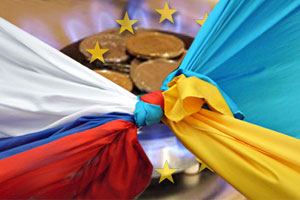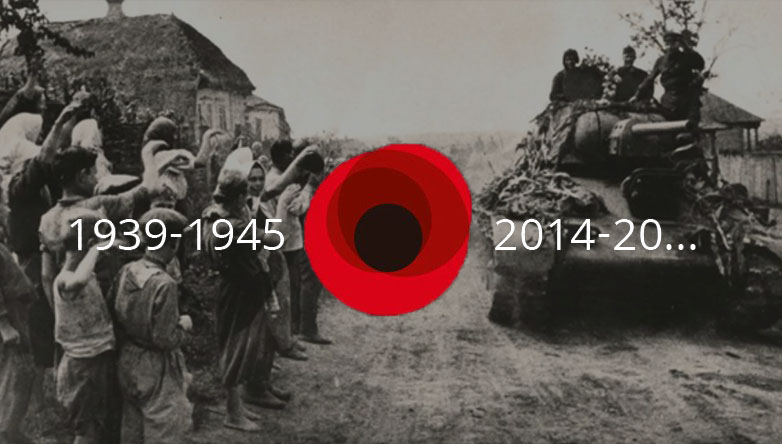Alyona Vershinina, “Echo Moskvi” journalist
The last time I was in Ukraine was over half a year ago – in the beginning of November of the previous year. Back then the country was waiting that Yanukovych would soon let out Timoshenko to undergo treatment in Germany, and several weeks later he would sign that infamous association agreement with the EU. Everyone knows what happened next. That the attitude towards Russia and Russians has changed is palpable literally from the first second, as soon as you step out from the airplane in Borispyl. The Ukrainians still love Russians very much. They are happy to see you personally, but overall they regard Russian citizens as a whole with heightened caution. And this is presented in absolutely everything.
Here is the conversation at the passport control:
“What is the purpose of your visit to Ukraine?”
“The Okean Elzy concert.”
“When are you flying back?”
“Monday.”
“Do you have a return ticket?”
“Yes.”
“You only came for the Kyiv concert?”
“Yes.”
“Have a good concert. I hope you enjoy it.”
“Thank you.”
Finally, I got the stamp regarding the crossing of the border. I will note that during the conversation I had the concert and plane tickets printed out in my hands. Just in case.
The Moscow flight to Boryspil came 10 minutes later than the one from St. Petersburg, so we are standing in line for passport control all together. Lonely men with Russian citizenship are immediately sent for further interviews. There are few such individuals on both flights. Some are let through the border after a long conversation. However three were denied entry. The reason – they were unable to confirm the purpose of their visit to Ukraine. Among these three is my colleague from St. Petersburg Maksim Yarygin. As a result, Maks spent 9 (NINE) hours in the international transfer lounge. He was only let through to Ukraine thanks to a personal intervention by Svyatoslav Vakarchuk. Meanwhile the border workers also wished Maksim a good concert in lieu of goodbye. A few hours later, when everything was over and we finally got to Kyiv, Matvey Ganapolskiy dialed Vakarchuk’s number and gave me the phone. I could hear the Kyiv rehearsal of the Okean Elzy concert. What could I say to Svyatoslav in this situation? Thank you for helping our Maksim, say sorry for MP Milonov, because of whom OE concerts were cancelled in Russia, wish a great performance in Kyiv. And you know what Vakarchuk replied? He apologised for the Ukrainian border workers. “What to do? I myself spend a long time going through passport control in Russia,” added the OE leader. And he promised that everything will definitely be all right.
The same happened at the Okean Elzy concert itself in Kyiv. Between the performance of the Donetsk band Fontaliza which played at the beginning and the start of the show, almost an hour passed. It was exemplary how the 70 thousand audience behaved meanwhile. The fans alternated between shouting, “Okean! Okean!”, “Vakarchuk, come out!”, and bursted into the Ukrainian national anthem. Sometimes the Olimpiyskiy stadium echoed with the already familiar words: “Glory to Ukraine! – To the heroes glory!” and “Glory to the nation! – Death to the foes!” They did not forego the popular song of the football fans about Putin. The same one that was repeated by the former acting MFA of Ukraine Andriy Deshchitsya in front of the Russian Embassy in Kyiv. And waves of “Putin – la-la-la!” echoed over the stadium. And it was always started by a lone male voice which, laughing, was joined by the entire stadium. And then, almost all 70 thousand, still laughing, started jumping and yelling: “Who doesn’t jump is a moskal!”
“Why aren’t you jumping?” Ukrainian girls standing next to us tortured their friend. “Come on, jump! You’re not a moskal!”
Meanwhile the Christmas Tree which was never assembled for New Year’s on Maidan and which is still covered in posters claims: “We love Russians – we hate Putin!”
When three and a half hours later we were exiting the stadium and stood in a small line at the turntables, other Ukrainian girls identified us as Russians.
“Where did you come form?”
“We’re from Moscow.”
“Okean Elzy is banned there, right?”
“Not really banned, but the spring concerts were cancelled.”
“And you came to Kyiv on purpose?”
“Yes. Especially because rock bands always give special performances in their Motherland.”
“That is true. But so good for, that you weren’t afraid to come!”
The same was repeated several hours later by ambulance paramedics which we had to call: “My mother lives in Rosov. So she told me she wouldn’t come to see me! But you see that everything is calm here and nobody is killing anybody. Let Russians come here in peace! There is nothing to be afraid of here!”
Speaking of which, there are no problems with the Russian language in Kyiv. Ukrainians have spoken it and still do. Before the concert I observed a group of Ukrainian teenagers of 15-17 years in the fan zone. They spoke Russian exclusively among themselves. They were discussing the results of the Ukrainian project “Voice” (the winner of the last season of which, by the way, was Svyatoslav Vakarchuk’s protegee) and the possible editing of several of the lines of the Ukrainian anthem. But as soon as the fans started singing it, the guys easily switched to Ukrainians. When Vakarchuk spoke Ukrainian to the audience during the concert, some of them translated his words into Russian so that everyone would be able to understand.
In cafés, shops and pharmacies they have no problem replying in Russian, even if a minute ago they were conversing in Ukrainian. And even the few residents of the camp in Maidan and Khreshchatik, the guards of Maidan, are also easily able to tell you in Russian about the events of the past winter. And some of them speak Russian among themselves.
Or here is another example. In some cafés and restaurants with Ukrainian cuisine, the waiters really do only speak Ukrainian. But this is the policy of the chain, an immersion into Ukrainian culture of sorts. It seems that the waiters are prohibited from speaking any other language on principle. Because two Germans were ordering their dinner next to me. They spoke Russian very well. With a palpable accent, but fluently. They asked to be spoken to in Russians, because they don’t understand Ukrainian. The waiter simply ignored the request. Later I heard him speaking to his colleagues in Russian. So all the tales that Ukrainians are not speaking Russian on principle are myths and legends.
However as soon as the conversation turns to Russia as a whole the happiness and love disappear. Perhaps it should not be said why. Even my colleagues in Kyiv which know the situation in Russia very well, will sometimes slip that Echo Moskvia and that man who came to the Embassy is the last hope that there are good people in Russia…
And at the world football championship this time Ukrainians rooted against Russia on principle. But let’s not talk about very sad things.
… one of the most famous songs of Okean Elzy at the moment is the song, Stina (‘The Wall’): “Where will we be, when their war ends? Will we have enough strength to make is so that the wall between us falls?” Once Vakarchuk wrote it about a relationship between lovers. (In Vakarchuk’s lyrics love is overall a complex emotion and almost always borderline). Today these lines are about the East and West of Ukraine, about the relations between Russia and Ukraine. Patriotism and love for one’s neighbours is also a complex emotion, also an art, if you will. Will there be enough strength? Russia and Ukraine has less and less in common. Ukrainians don’t want to be similar to Russians, in which they see pro-Putin hurrah-patriots. And this is why Ukraine is Europe. Okean Elzy’s music in this regard does much more for the connection between the two peoples than all the bilateral diplomacy which has been exchanging Facebook posts, songs by embassies and statements of the Investigative Committee recently. Vakarchuk simply makes one fall in love with the Ukrainian language and Ukrainian music. Hippies won the war thanks to love and John Lennon’s rebellious songs. Maybe 40 years later we will be able to overcome the war between the nations through music… Let everything really be all right for everyone. And let the wall between the people, which is becoming stronger with each passing day, fall.
Source: Echo Moskvi
Translated by Mariya Shcherbinina












